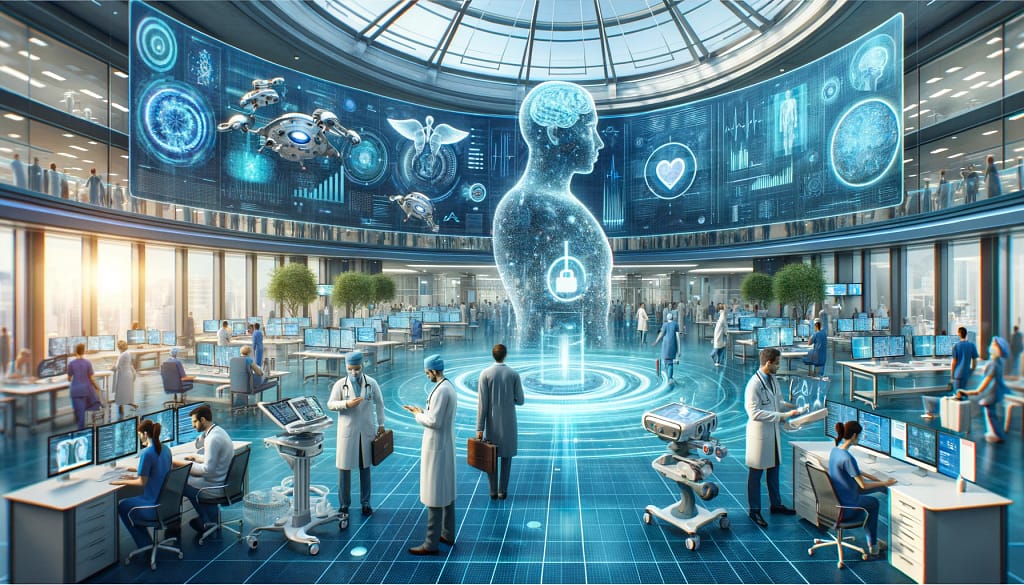Navigating the New Frontier: The Rise of AI in Healthcare
- June 29, 2023
- Posted by: Cheryl Li
- Category: AI & AI Automation Trends

The advent of Artificial Intelligence (AI) in healthcare marks a revolutionary shift in the way medical professionals approach diagnosis, treatment, and patient care. This transformative technology is not only enhancing the efficiency and accuracy of healthcare services but is also opening new avenues for personalized medicine, making significant strides in research, and redefining patient engagement. This article explores the complex effects of AI in healthcare, including its uses, advantages, obstacles, and the ethical issues it raises.
Transforming Diagnosis and Treatment
One of the most notable applications of AI in healthcare is in diagnostics. AI algorithms, particularly those based on deep learning, have shown remarkable ability in interpreting medical images such as X-rays, CT scans, and MRIs with precision that matches or even surpasses that of human experts. For instance, Google’s DeepMind developed an AI that can accurately detect over 50 types of eye diseases from 3D retinal scans and recommend the referral pathway. This not only expedites the diagnostic process but also significantly reduces the margin of error, leading to improved patient outcomes.
AI’s impact extends beyond diagnostics into treatment planning and predictive analytics. By analyzing vast datasets, AI systems can identify patterns and predict disease progression, enabling healthcare providers to tailor treatment plans to the individual needs of patients. This is particularly impactful in the field of oncology, where AI-driven tools analyze genetic information alongside clinical data to recommend personalized treatment regimens, considering the efficacy and side-effect profiles of various cancer therapies.
Revolutionizing Drug Discovery and Development

The traditional drug discovery process is notoriously time-consuming and costly, often taking over a decade and billions of dollars to bring a new drug to market. AI is poised to revolutionize this landscape by significantly accelerating the drug discovery process and reducing associated costs. AI algorithms can sift through extensive databases of chemical compounds, predict their interactions with biological targets, and identify potential drug candidates at an unprecedented pace. This capability was notably demonstrated in the recent global health crisis, where AI was used to rapidly screen thousands of existing drugs for their potential to treat COVID-19, accelerating the identification of viable therapeutic options.
Enhancing Patient Care and Experience
AI is also transforming patient care and experience. Telemedicine, powered by AI, has become increasingly prevalent, providing patients with access to healthcare services from the comfort of their homes. AI-powered chatbots and virtual health assistants provide round-the-clock assistance, responding to questions, sending health reminders, and monitoring patients’ health conditions via wearable technology. This not only improves the accessibility and responsiveness of healthcare services but also empowers patients to take an active role in managing their health.
Overcoming Challenges and Ethical Considerations
Despite its potential, the integration of AI in healthcare is not without challenges. Data privacy and security are paramount concerns, given the sensitive nature of health information. Ensuring the robustness of AI systems against data breaches and unauthorized access is crucial to maintaining patient trust and safeguarding personal information.
Bias in AI algorithms poses another significant challenge. If the training data is not representative of the diverse patient population, there’s a risk of biased outcomes, which could lead to disparities in healthcare delivery. Addressing this requires a concerted effort to ensure diversity and inclusivity in training datasets and continuous monitoring and refinement of AI systems.
The ethical implications of AI in healthcare also warrant careful consideration. Questions around accountability, particularly in the event of misdiagnoses or treatment failures, and the impact of AI on the patient-physician relationship, need to be addressed. Establishing clear guidelines and ethical frameworks for the use of AI in healthcare is essential to navigate these complexities.
Looking Forward: The Prospects of AI in Healthcare
As we look to the future, the role of AI in healthcare is set to expand further. Advances in AI technology, coupled with the increasing digitization of healthcare data, will continue to drive innovation in this field. From more sophisticated diagnostic tools and treatment options to enhanced patient engagement and care delivery models, the possibilities are vast.
However, realizing the full potential of AI in healthcare requires more than technological innovation. It calls for collaboration across disciplines, including medicine, computer science, ethics, and policy-making, to ensure that AI is developed and deployed in a manner that is safe, effective, and equitable. Investing in education and training for healthcare professionals on the use of AI tools, and fostering public awareness and understanding of AI in healthcare, will also be key to maximizing its benefits.
Conclusion
In conclusion, the rise of AI in healthcare is a defining development in the evolution of medical care. With its ability to enhance diagnosis and treatment, streamline drug discovery, and improve patient care and experience, AI holds immense promise for transforming healthcare. Navigating the challenges and ethical considerations it presents will be crucial in harnessing the power of AI to create a more efficient, effective, and equitable healthcare system for all.

